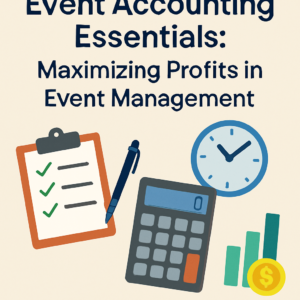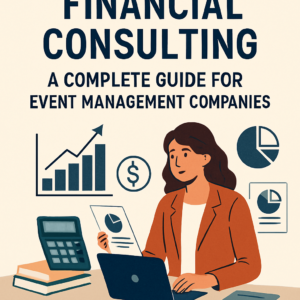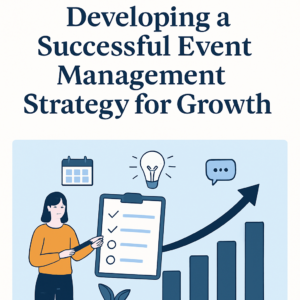Mastering Cash Flow: Essential Strategies for Event Management Success
Introduction
Welcome to the dynamic world of corporate event management, where every experience is an opportunity and every decision can be the difference between a grand celebration and a logistical nightmare. As the heartbeat of this fast-paced industry, you’re no stranger to juggling endless tasks—from liaising with vendors to creating unforgettable experiences for your clients. But amidst the confetti and contracts, one unsung hero stands out: cash flow management.
Let’s face it, while brainstorming the perfect gala theme or managing last-minute changes to seating arrangements might get you excited, poring over spreadsheets probably doesn’t. Yet, mastering cash flow is crucial in ensuring your business not only survives but thrives. It’s akin to being the maestro of a symphony—ensuring all financial components play in harmony. Without it, even the most brilliant event plans can unravel faster than a poorly coordinated flash mob.
“Managing cash flow effectively is like choreographing a dance—it’s all about timing and precision.”
In this blog post, we’re diving deep into essential strategies for successful cash flow management tailored specifically for event managers. Think of it as your financial toolkit—equipped with practical advice that’s direct, relatable, and easy to implement.
We’ll explore:
- Cash Flow Analysis: Understanding where you are now.
- Working Capital Management: Keeping everything moving smoothly.
- Financial Planning: Mapping out your future successes.
The importance of cash flow can’t be overstated. According to Forbes, poor cash flow management is responsible for up to 82% of business failures. So buckle up as we embark on this journey together—let’s turn those daunting numbers into your business’s best friend!
Understanding Cash Flow Management Basics
Alright, let’s get cozy with the concept of cash flow management. Picture it as the lifeblood of your corporate event management business – it’s what keeps the party going, literally and figuratively. Now, while we’re all for a good time, mastering cash flow isn’t just about ensuring there’s enough in the kitty to pay for those extra balloons or last-minute pyrotechnics. It’s about having a strategic grasp on your financial in-and-out game to ensure long-term business success.
Why Cash Flow Matters
Having a solid handle on cash flow means you’re never caught off guard by surprise expenses or unexpected downturns. Think of it like having an umbrella when you’ve planned an outdoor event and suddenly, boom! Rain. Here’s why it’s crucial:
- Smooth Operations: Ensures you can cover operational costs such as venue bookings and staff payments.
- Avoid Debt Pitfalls: Prevents reliance on loans that could lead you to a debt trap.
- Investment Planning: Allows you to make informed decisions about reinvesting in your business.
The Key Components
Diving into cash flow management might sound like we’re heading into a labyrinth of spreadsheets and number crunching. But fear not! Let’s break down some essential components:
- Cash Flow Statement: This is your trusty roadmap, detailing how much cash is coming in and going out within a specific period. It helps in performing a thorough cash flow analysis.
- Cash Flow Forecasting: Think of this as peering into a crystal ball but with numbers. Forecasting helps you anticipate future financial positions and plan accordingly.
- Working Capital Management: This ensures that you have sufficient short-term assets to cover short-term liabilities. It’s like having enough snacks for everyone at the event!
A Real-Life Anecdote
I once worked with an event planner who was all about glitz and glam until she realized her cash reserves were as empty as my coffee mug by mid-afternoon. A quick dive into her cash flow statement revealed overspending on extravagant venues without considering incoming payment cycles from clients. With proper strategic financial planning, she was able to realign her spending habits and build healthier cash reserves.
“Incorporating structured cash flow management isn’t just smart; it’s essential for sustainable business growth.” — An Experienced CFO at Kommas with Kelle
Kicking off with these basics can help you sail smoothly through fiscal storms, ensuring that every event is not only successful but also financially rewarding. Remember, understanding these fundamentals sets the stage for more advanced strategic decisions down the line.
Importance of Cash Flow Forecasting in Event Management
Okay, event managers, let’s talk cash flow forecasting. Imagine you’re the captain of a ship navigating through the unpredictable seas of corporate events. Your cash flow forecast is your weather map, giving you a sneak peek into financial storms or sunny days ahead. No one wants to be caught off guard by an unexpected downpour of expenses, right?
Cash flow forecasting is not just an accounting term thrown around in business meetings—it’s your financial crystal ball. By predicting your cash inflows and outflows, you can make informed decisions that keep your business afloat and thriving. Here’s why it’s essential:
- Strategic Planning: With a clear picture of future finances, you can plan for those lavish events without sweating over last-minute funding.
- Spotting Trends: Regular forecasting allows you to identify patterns in revenue and costs, helping you adjust strategies accordingly.
- Avoiding Crises: It’s like having an early warning system for potential shortfalls, allowing you to take action before it’s too late.
Now, let’s sprinkle in some real-world magic with an example—imagine you’re organizing a tech conference. You anticipate venue costs, speaker fees, catering expenses… the whole shebang! A comprehensive cash flow forecast will help you manage these expenses while ensuring client payments come in on time. This balance ensures you’re not left paddling upstream without any funds to cover costs.
“Forecasting isn’t about predicting the future; it’s about minimizing surprise.” – Anonymous
To make this process less daunting (and let’s face it—more exciting), consider integrating advanced tools or engaging a Fractional CFO. These experts can lend their strategic prowess to ensure your forecasts are as accurate and insightful as possible.
In sum, mastering cash flow forecasting is like unlocking a secret superpower for event management success. Embrace it and watch your business grow!
Developing Strategic Financial Planning Practices
Let’s face it—when it comes to cash flow management, a well-thought-out strategic financial plan can be your best friend. It’s like having a GPS for your business finances, ensuring you’re always on the right path even in the dizzying world of corporate event management. Here’s how you can master the art of strategic financial planning without needing a magic wand.
Understand the Basics
First things first, let’s break down what strategic financial planning entails. It’s not just about crunching numbers but envisioning where your business wants to go and how you’ll get there financially. According to Forbes, it’s about creating actionable plans that align with your long-term goals.
- Cash Flow Forecasting: Predict future cash inflows and outflows. This is crucial for anticipating shortages or surpluses in cash.
- Expense Tracking: Keep tabs on every penny leaving your account to avoid unnecessary costs that could derail plans.
- Profit Maximization Strategies: Identify ways to boost profitability without compromising quality or service.
The Role of Professional Guidance
If this sounds overwhelming, don’t worry! You’re not alone in this journey. Engaging with a professional can provide invaluable insights and help streamline processes. As noted in our article on The Role of a Strategic CFO in Driving Business Growth, having someone who understands the intricacies of financial planning can transform your business trajectory.
“In today’s competitive landscape, having a strategic CFO isn’t just an asset; it’s a necessity.” – The Kommas with Kelle Team
Create Contingency Plans
No matter how solid your plan is, unexpected events—like global pandemics or sudden market changes—can knock you off course. This is where contingency plans come into play:
- Cash Reserves Management: Keep an emergency fund that’s easily accessible for unforeseen circumstances.
- Diversified Revenue Streams: Explore multiple revenue avenues to cushion against downturns in specific areas.
- Risk Assessment & Mitigation: Regularly assess risks and develop strategies to minimize them effectively.
Avoid being caught off guard by making sure you’re always ready for financial surprises. Think of it as carrying an umbrella even when there’s just a slight chance of rain!
The Power of Regular Review
Your financial plan isn’t set in stone; it’s more like clay—malleable and ready for reshaping as needed. Conduct regular reviews to evaluate performance against set goals, adjust forecasts, and ensure alignment with evolving business objectives.
This proactive approach not only aids in maintaining liquidity but also enhances overall financial health, setting your event management business up for success today and tomorrow!
Optimizing Working Capital for Liquidity Management
Hey there, event management maestros! Let’s dive into the nitty-gritty of keeping your cash flow as smooth as a waltz on a polished ballroom floor. We all know that in the world of corporate events, timing is everything—from setting up the stage to settling those bills. So how can you ensure there’s enough cash on hand to keep things running without breaking a sweat? The secret sauce lies in optimizing your working capital.
A Closer Look at Working Capital
- Current Assets: This includes cash, inventory, and accounts receivable. Consider these your event assets—essentially what you have on hand or will soon have.
- Current Liabilities: Think of these as your immediate financial obligations like suppliers’ payments and short-term debts.
The goal is to maintain a healthy balance between these two. When current assets exceed current liabilities, you’re in the green zone with positive working capital—a.k.a., you’re doing great!
Strategies for Optimizing Working Capital
Here are some practical strategies you can implement right away to enhance liquidity management:
- Tighten Your Accounts Receivable Process: Encourage early payments by offering discounts or incentives. You might not need to do a joyful backflip when a client pays early, but a happy dance is definitely acceptable!
- Manage Inventory Effectively: Avoid overstocking supplies by forecasting demand accurately. Remember, less can sometimes be more when it comes to inventory.
- Negotiate Payment Terms with Suppliers: Extending payment cycles can help you hold onto cash longer while still maintaining good relationships with vendors.
- Monitor Cash Flow Regularly: Use tools and templates like our Ultimate Debt Tracker Template to stay on top of financial obligations and make informed decisions quickly.
“Effective cash flow management is crucial for survival and growth in any business.” — Harvard Business Review
If you’ve ever found yourself rummaging through paperwork three days before an event searching for lost invoices (guilty!), it’s time to put systems in place that prevent such stress-induced scavenger hunts. Investing time in setting up robust processes will pay off tenfold by allowing you more flexibility during high-demand seasons.
Ready to take your liquidity management skills up a notch? Check out our guide on the role of strategic CFOs in driving business growth by clicking on this link: The Role of a Strategic CFO in Driving Business Growth. And remember, you’re not alone—Kommas with Kelle is here every step of the way!
Implementing Expense Tracking and Control Methods
Picture this: you’re in the middle of orchestrating a massive corporate event. The lights are twinkling, the attendees are buzzing, and somewhere in the background, your budget is having an existential crisis. Sound familiar? If so, it’s time to implement robust expense tracking and control methods to ensure your events not only shine but also align with your financial goals.
Why Focus on Expense Tracking?
Expense tracking isn’t just about keeping tabs on where your money is going; it’s about empowering you with the information needed to make smarter financial decisions. According to a study by PwC, companies that actively manage their expenses can increase profitability by up to 30%. Now, who wouldn’t want a slice of that pie?
Tools and Techniques for Effective Expense Management
- Leverage Technology: Digital tools like expense tracking apps can help automate and simplify the process. Consider using platforms that integrate seamlessly with your existing systems—like enterprise resource planning (ERP) software—to maintain a holistic view of your finances.
- Create a Detailed Budget: Think of budgeting as your event’s financial blueprint. A detailed budget helps you identify potential cost overruns before they occur. This proactive approach is essential for effective cash flow management.
- Regular Monitoring: Implement monthly cash balance monitoring practices to keep a close eye on financial health throughout the event lifecycle. This ensures no nasty surprises crop up when you’re least expecting them.
- Engage Your Team: Ensure everyone involved understands the financial limits and goals. A bit of teamwork goes a long way in adhering to budgets while still delivering high-quality events.
“In an era where every dollar counts, expense control isn’t just good practice—it’s crucial for ensuring business sustainability,” says John Smith, CFO at EventFinance Corp.
The Role of Revenue Cycle Management in Financial Health
Let’s get real for a moment—managing the revenue cycle in your event management business is like trying to juggle flaming torches. It’s not just about keeping those torches in the air; it’s about doing so with elegance, ensuring nothing burns down in the process. That’s where revenue cycle management steps in to save the day, bringing a much-needed balance between your income and expenses.
Why Revenue Cycle Management Matters
Revenue cycle management (RCM) is crucial for maintaining the financial health of your event management enterprise. It encapsulates all the administrative and clinical functions that contribute to the capture, management, and collection of client service revenue. In simpler terms, RCM ensures you’re getting paid promptly and correctly for the services you render.
- Streamlining Billing Processes: Effective RCM simplifies billing, reducing errors and ensuring invoices are sent out on time.
- Improving Cash Flow Management: By optimizing how you handle receivables, RCM can significantly enhance your cash flow. Remember, it’s not just about making money; it’s about making sure that money flows smoothly.
- Enhancing Client Satisfaction: A transparent billing process increases trust and satisfaction among clients, who appreciate clarity just as much as a well-executed gala dinner.
If you’re wondering how RCM ties into broader financial strategies, consider exploring the role of a strategic CFO in driving business growth. A strategic CFO can leverage insights from RCM to bolster financial stability and business growth.
Tangible Benefits of Effective Revenue Cycle Management
So what’s on offer when you nail this aspect of financial strategy? Well, it’s akin to unlocking a treasure trove that enhances every corner of your business:
- Reduced Days Sales Outstanding (DSO): Effective RCM practices can lower DSO rates, meaning you’re converting sales into cash more swiftly.
- Enhanced Financial Planning: With clearer revenue streams, planning becomes less guesswork and more strategy-driven. This allows for better budgeting and forecasting—a necessity when orchestrating events with numerous moving parts.
- Sustained Business Growth: By securing liquidity through improved cash flow practices, you invest back into your business more confidently—whether that’s hiring top talent or expanding service offerings.
“Revenue cycle inefficiencies can lead to increased costs by as much as 15-25%.” – Becker’s Hospital Review
This statistic from Becker’s highlights how mismanagement can inflate costs substantially—a fact that underscores why mastering this aspect of finance is so vital. You wouldn’t want unnecessary expenses cutting into profits like an uninvited guest at an exclusive event!
The bottom line? Mastering revenue cycle management isn’t just advisable—it’s essential if you want your corporate event empire not merely to survive but thrive amidst fierce competition. After all, there’s no room for dropped torches here!
Enhancing Operational Efficiency Through Financial Metrics Evaluation
In the fast-paced world of corporate event management, keeping a keen eye on financial metrics is like having a GPS guiding you through a labyrinth of expenses, revenues, and cash flow. It’s essential to ensure your operation runs as efficiently as a well-orchestrated symphony. As we delve into enhancing operational efficiency through financial metrics evaluation, let’s unravel some strategies that could make your financial dance as smooth as possible.
The Vital Role of Key Performance Indicators (KPIs)
First things first, let’s talk KPIs. These are not just fancy numbers on a spreadsheet; they’re the heartbeat of your business operations. Some crucial KPIs for event management include:
- Profit Margin: This measures the percentage of revenue that exceeds expenses, crucial for assessing financial health.
- Current Ratio: A liquidity ratio that measures a company’s ability to pay short-term obligations.
- Accounts Receivable Turnover: Reflects how effectively you’re collecting cash from clients.
A study published by PwC indicated that companies focusing on detailed KPI monitoring saw an average increase in profitability by up to 20% over three years. So yes, it’s worth paying attention!
The Power of Cash Flow Forecasting
Next up is cash flow forecasting—essentially your crystal ball for predicting future financial conditions. According to an article in Deloitte Insights, businesses utilizing accurate cash flow forecasts reduce their risk of insolvency by up to 40%. Now that’s some magic trick! By regularly evaluating inflows and outflows, you’ll be better equipped to avoid any unpleasant financial surprises.
Understanding Financial Health with Balance Sheet Analysis
If financial statements were superheroes, the balance sheet would be Batman – noble and precise. By diving into balance sheet analysis, you can understand the real-time snapshot of your assets versus liabilities. This helps in ensuring that you’re not just floating but actually swimming in the right direction financially.
For event managers juggling multiple projects at once, this becomes particularly vital. Imagine having clear insights into whether you have enough working capital to take on that dream client or if it’s wiser to consolidate resources first—it all starts with effective evaluation.
“Monitoring key financial metrics has tangible benefits – it directly contributes to improved decision-making processes and operational efficiencies.” — Harvard Business Review
The Strategic CFO: Your Financial Compass
If this feels overwhelming, consider enlisting the expertise of a fractional CFO. These professionals have honed skills in optimizing business cash flows and can provide strategic insights tailored to your unique operation needs. To learn more about how they can assist in driving business growth, explore our guide on Understanding What is a Fractional CFO & Their Key Benefits.
Navigating through these metrics might seem daunting initially, but with every step forward, you’re securing not just your business’s present but its future too! Remember: The goal isn’t just survival—it’s thriving with finesse!
Exploring Innovative Funding Solutions for Business Continuity
When it comes to keeping the financial gears of your event management business turning, sometimes traditional methods just don’t cut it. But fear not! Innovative funding solutions are here to swoop in like a superhero on a budget-saving mission. Let’s dive into some brilliant alternatives that can bolster your cash flow management and ensure business continuity, even in the stormiest of times.
Crowdfunding: The Power of the People
Crowdfunding isn’t just for quirky gadget startups or aspiring filmmakers anymore. It’s rapidly becoming a viable option for businesses seeking a quick injection of funds without jumping through bank hoops. Platforms like Kickstarter, GoFundMe, and Indiegogo allow you to raise capital by reaching out directly to your audience. Imagine launching a campaign to fund your next big corporate event project and managing the funds seamlessly through efficient bookkeeping.
Peer-to-Peer Lending: A Modern Twist on Borrowing
If you’ve ever borrowed sugar from a neighbor (or Netflix passwords), you’re already familiar with the concept of peer-to-peer lending—just add money into the equation! This method connects borrowers directly with individual lenders through platforms like LendingClub or Prosper, often resulting in lower interest rates compared to traditional loans. It’s like borrowing money from a friend but without awkward Thanksgiving dinners.
Invoice Financing: Turn Receivables into Ready Money
When cash flow is tight, yet you’ve got invoices waiting to be paid (looking at you, slow-paying clients!), invoice financing can be your secret weapon. This method allows businesses to get advances on outstanding invoices, providing instant liquidity without taking on debt. Think of it as an “I.O.U.” redemption system with benefits!
Strategic Partnerships: Collaborate and Thrive
Ever heard the saying “two heads are better than one”? Strategic partnerships allow businesses to combine resources and expertise, widening opportunities for investment without directly taking out loans. By partnering with other companies or even exploring options with a fractional CFO, you can tap into new revenue streams while sharing risks—a win-win scenario!
“Adaptability is about the powerful difference between adapting to cope and adapting to win.” — Max McKeown
Remember, these innovative solutions are not just about getting funds but also about maintaining financial agility so that your business is ready for whatever comes its way. By leveraging these modern tools and resources, you’ll be equipped not only to survive but thrive in the ever-evolving landscape of corporate event management.
If you’re curious about more strategies that can help boost your business growth sustainably, check out our guide on business growth strategies for small businesses.
Conclusion: Achieving Financial Sustainability in Event Management
As the grand finale in our journey to mastering cash flow management, let’s take a moment to reflect on what achieving financial sustainability means for your event management business. It’s not just about keeping the lights on and your team caffeinated (though those are definitely priorities). It’s about crafting a resilient financial structure that supports growth, innovation, and adaptability.
The Keys to Financial Sustainability
- Cash Flow Forecasting: Anticipate future financial states with precision. Regular forecasting helps you stay ahead of any potential shortfalls.
- Expense Tracking: Keep an eagle eye on where your money is going. Consider leveraging tools like our Ultimate Debt Tracker Template for precision tracking.
- Diversifying Revenue Streams: Explore new avenues for revenue. Whether it’s branching into virtual events or offering bespoke services, diversification can buffer against industry shifts.
- Working Capital Management: Efficiently manage your short-term assets and liabilities to maintain liquidity. This helps ensure that unexpected expenses don’t derail your operations.
The Strategic Role of a CFO
A seasoned CFO can be instrumental in steering your company towards sustainable growth. They bring expertise in financial planning, risk management, and operational efficiency that can be game-changing. For those looking to scale without the full-time cost, understanding what a Fractional CFO offers might be worth considering.
“Financial stability isn’t just about surviving; it’s about being prepared to seize opportunities as they arise.”
Navigating the complexities of cash flow analysis doesn’t need to feel like deciphering a Rube Goldberg machine. With strategic planning and sound financial practices, you can transform cash flow from a stress-inducing challenge into a tool for empowering business success.
Your journey towards financial sustainability is not just a destination but an ongoing process—one that promises rewards far beyond the balance sheet.









